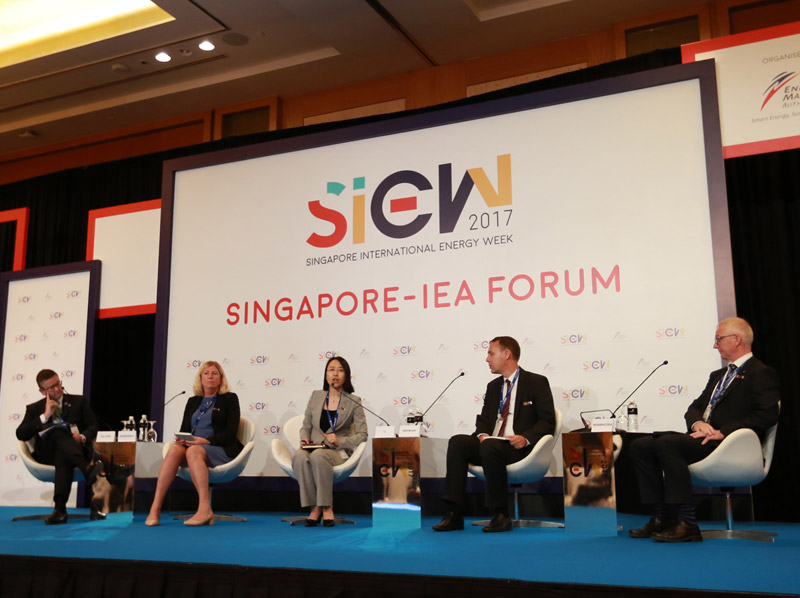By David Yeo and Kannan Arunachalam
Electricity sector investment overtook oil and gas for the first time in 2016, said Mr Michael Waldron, Energy Investment Analyst, International Energy Agency (IEA). This statement, which opened Panel 2 of the Singapore-IEA Forum, set the tone for the discussions that followed.

Mr Waldron said that renewables are leading the way in electricity sector investment, with energy efficiency coming in as the largest growth sector. He added that an increasingly larger proportion of grid spending is shifting to digital smart grid infrastructure with advanced connectivity and communication.
While the increased investment in the electricity sector is heartening, there is much room for growth in global R&D efforts towards clean energy. The total R&D expenditure in clean energy globally is lower than the combined R&D expenditure in IT of the world’s top three companies.
With a shift in mindset towards innovation and disruptive technology, businesses and governments will have to embrace change and adapt accordingly.
Navigating Grid Transformation
To comprehensively cover the issues at hand, the panel was split into two sub-panels moderated by Mr Michael Salcher, Global Sector Head of Power and Utilities, KPMG. The first focused on navigating grid transformation.
Dr Li Jun, Deputy Director General of the Technology and Economic Research Institute at the Global Energy Interconnection Development and Cooperation Organisation (GEIDCO), said that a more globally interconnected grid is necessary.
This would drastically change the energy landscape, she added, with countries being able to import and export electricity directly – replacing oil and gas trade.
Such an endeavour would need systems and market models to be redesigned and sufficiently robust, said Ms Ulla Sandborgh, President and CEO of the Swedish National Grid. Solutions such as digitisation and automation will need to be carefully calibrated and deployed to address issues.
For this to happen, Mr Karl Ove Ingebrigtsen, Low Carbon Power Generation Director, Lloyd’s Register, said that investor uncertainty must be reduced to encourage further investment in interconnection..
Fostering Business Innovation and Innovative Technologies
The second sub-panel focused on fostering business innovation and innovative technologies.
Mr Bernard Salha, Senior Vice President, EDF Group and President, EDF Research & Development, said that innovation is less about individual technologies and more about systems and applications.
He cited the Renewable Energy Integration Demonstrator – Singapore (REIDS) project, which focuses on integrating renewable energy sources with suitable energy storage systems to serve the needs of isolated villages and islands. The project aims to open up more micro grid possibilities in the region by showcasing how renewable energy powered micro-grids can reliably and inexpensively operate fully isolated while providing for interoperability between micro-grids.
On the consumer front, Mr Vijay Sirse, Founder, Chairman and CEO, Red Dot Power, shared that data analytics could add value to decision-making processes and encourage innovation in the energy sector.
Mr Sirse added that policy and regulatory frameworks are one of the main enablers of innovation and that greater cooperation between the public and private sectors is needed to accelerate innovation.
For example, Mr Tun Lean, Under Secretary of State, Ministry of Mines and Energy, Cambodia, shared how Singapore-based Sunseap Group and KrisEnergy are respectively involved in solar and oil developments in the Cambodia.